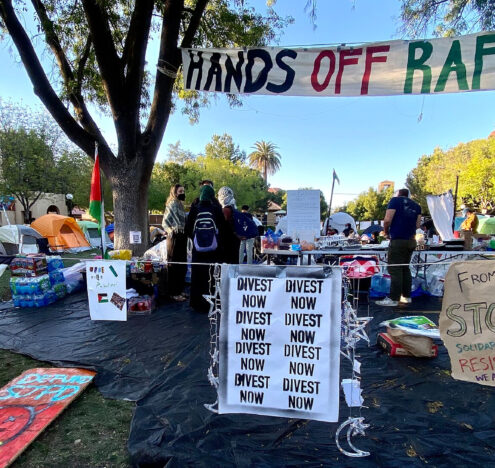In a couple weeks, millions will tune in to watch the 2024 Oscars ceremony. Viewers will discuss what and who nominees are wearing, what was or was not said in speeches, and who or what film should have won or rightly took home the golden statuette. But for all of the films and subject matter surrounding the Oscars, there is one underlying theme this year that should not be missed: nuclear disarmament.
The connection between Hollywood and nuclear disarmament is not new. Many films since 1945 have focused on the subject of nuclear weapons, including “Dr. Strangelove,” “On the Beach,” “Fail Safe,” “The China Syndrome,” “War Games,” “The Peacemaker,” and “The Sum of All Fears,” to name a few. Perhaps no movie had a bigger impact on the nuclear issue than the 1983 television film “The Day After.”
History of Activism
While such films have had success garnering the public’s attention to nuclear weapons, it has often been the stars of these films that have raised awareness by championing the cause of nuclear disarmament.
This was most evident in the 1980s. Throughout the decade, artists marched, petitioned, wrote letters to Congress, filmed public service announcements, and performed acts of civil disobedience to end the nuclear arms race.
Many of these celebrities were part of Performing Artists for Nuclear Disarmament (PAND), which formed in 1982. This group included the likes of Jules Feiffer, Robert Altman, Harry Belafonte, Eliot Field, Colleen Dewhurst, Ellen Burstyn, and Meryl Streep, among others. Moreover, Bruce Springsteen, James Taylor, Jackson Browne, and other artists routinely raised money for the cause through benefit concerts.
This action continued decades later when stars like Morgan Freeman, Matt Damon, and others were part of a public campaign supporting the Joint Comprehensive Plan of Action, also known as the Iran Nuclear Deal.
Not Just “Oppenheimer“
Now it appears that Hollywood is once again at center stage when it comes to the issue of nuclear disarmament. Of course, the favorite to sweep the Oscars, “Oppenheimer,” deals with the issue of nuclear weapons.
But Oppenheimer is not the only film that is based on a historical figure that cared deeply about this issue. Maestro, the biopic that focuses on composer Leonard Bernstein, is up for numerous awards including Best Picture. Bradley Cooper and Carey Mulligan are also nominated for Best Actor and Best Actress.
Bernstein was among the long list of celebrities in the 1980s who publicly supported an end to the arms race.
While the film is beautiful in covering Bernstein’s life, one aspect that did not make it into the movie was his activism for various social causes including HIV/AIDS, civil rights, and nuclear disarmament. Bernstein was among the long list of celebrities in the 1980s who publicly supported an end to the arms race.
Delivering the commencement address at Johns Hopkins University in 1980, Bernstein implored the students to use their imaginations and to not so easily dismiss the idea of disarmament. He asked the graduates, “Do you not find something reprehensible, even obscene, about the endless and useless stockpiling of nuclear missiles?”
Omitted History
Coleman Domingo has also received an Oscar nomination for his portrayal of civil rights icon Bayard Rustin. While Domingo delivers an amazing performance showing the importance of Rustin in the Civil Rights Movement, there is only one line in the film mentioning Rustin’s work on nuclear disarmament, and it comes from Chris Rock, portraying Roy Wilkins. Wilkins, who was no fan of Rustin, mocks Rustin for his work on the issue, describing it as “serving white people.” Rustin responds, “I go where I’m needed.”
The reality is that Rustin cared deeply about nuclear disarmament and fought to eliminate nuclear weapons throughout his life, often working with the Fellowship for Reconciliation, the War Resisters League, and other pacifist organizations.
His most significant action came in the summer of 1959, when French leaders decided to test their first nuclear weapon in Algeria. Rustin organized a team of activists to stop the nuclear test and literally put his body on the line, but to no avail.
This period of his life is completely omitted in the film, even though years later, looking back on his life, Rustin concluded that the Sahara protest was “the most significant non-violent project” in which he had ever participated.
A Moment to Educate
Thanks to these films, many, especially from this younger generation, are meeting J. Robert Oppenheimer, Bayard Rustin, and Leonard Bernstein for the first time. Social media has been flooded with people stating that they never knew Bayard Rustin existed or how the atomic bomb was created.
As great as these films are, it is impossible to encapsulate every aspect of these individuals’ lives in two to three hours. However, that does not mean we should ignore their work on fighting for peace. It is crucial that we build on these films.
This is a moment for all of us to educate and inspire this new generation in hopes that they follow in the footsteps of these legendary figures and use their voices and gifts to achieve a more peaceful world. Otherwise, will we not be failing Oppenheimer, Rustin, and Bernstein?
So come March 10, get your popcorn, hop on the couch, and enjoy the dresses and speeches. But on March 11, I hope you remember what was really at the heart of these films and get to work on your story of how you played a role in eliminating nuclear weapons. That’s a movie I would certainly watch. Enjoy the Oscars, everyone!





















